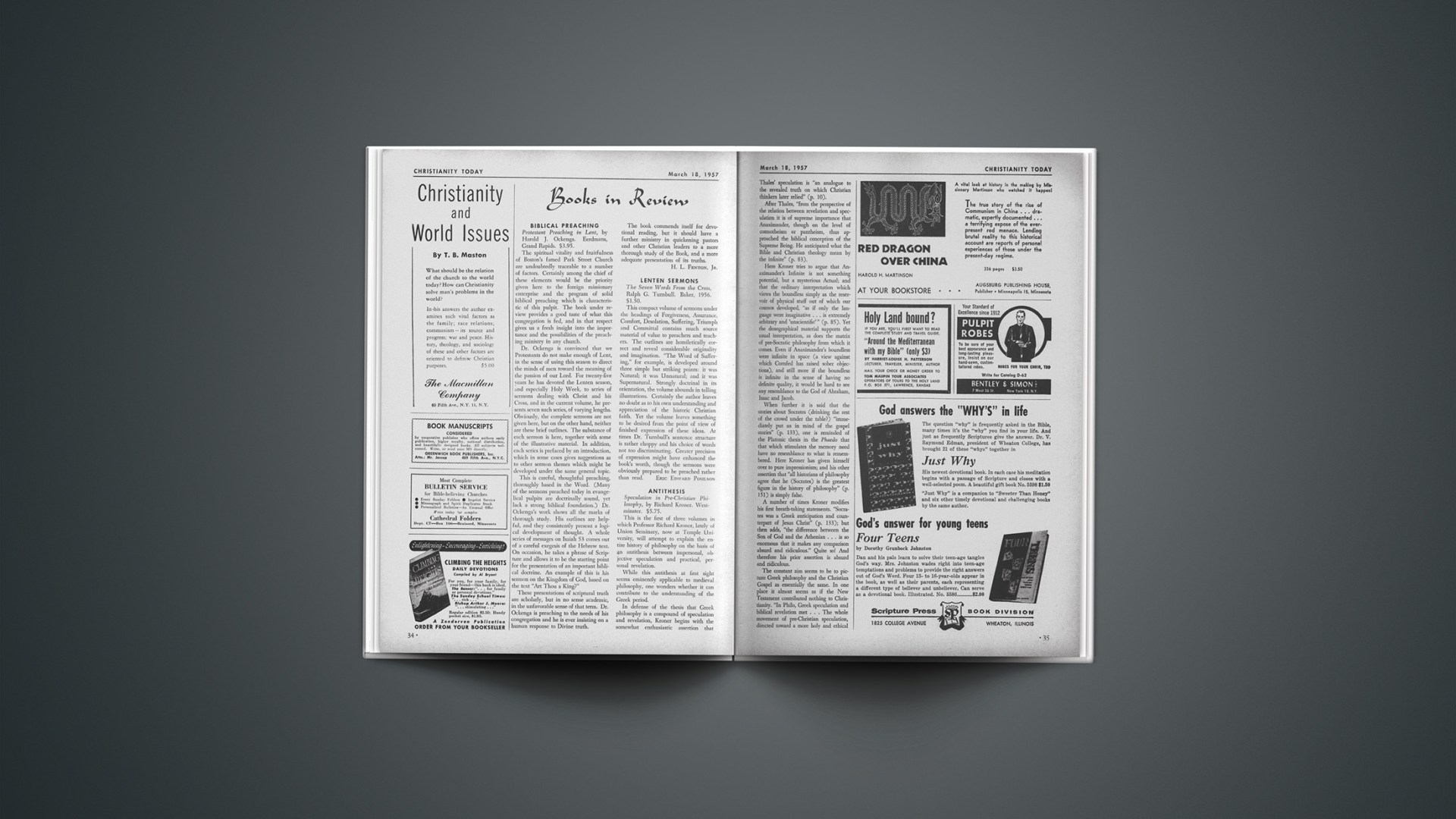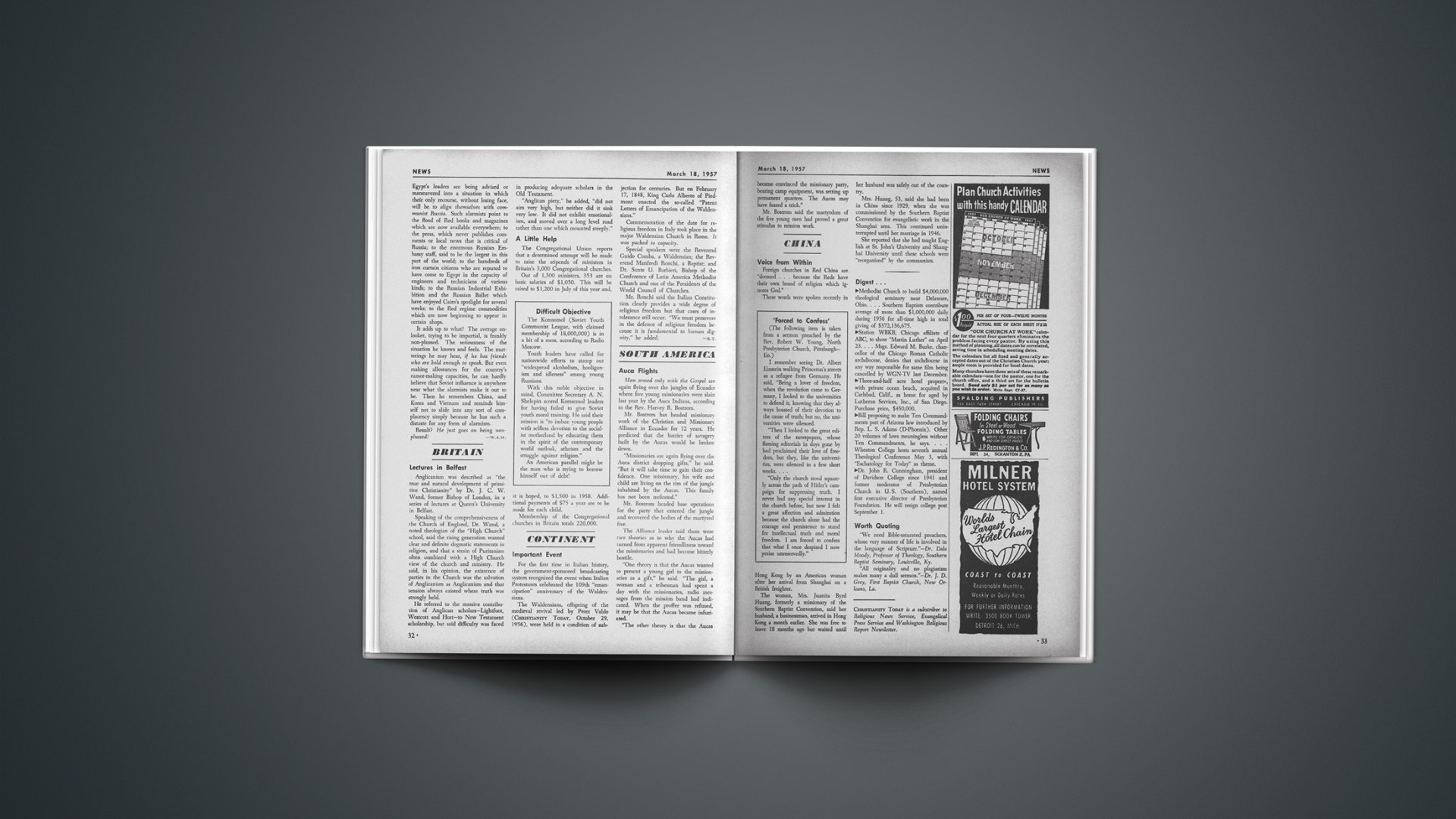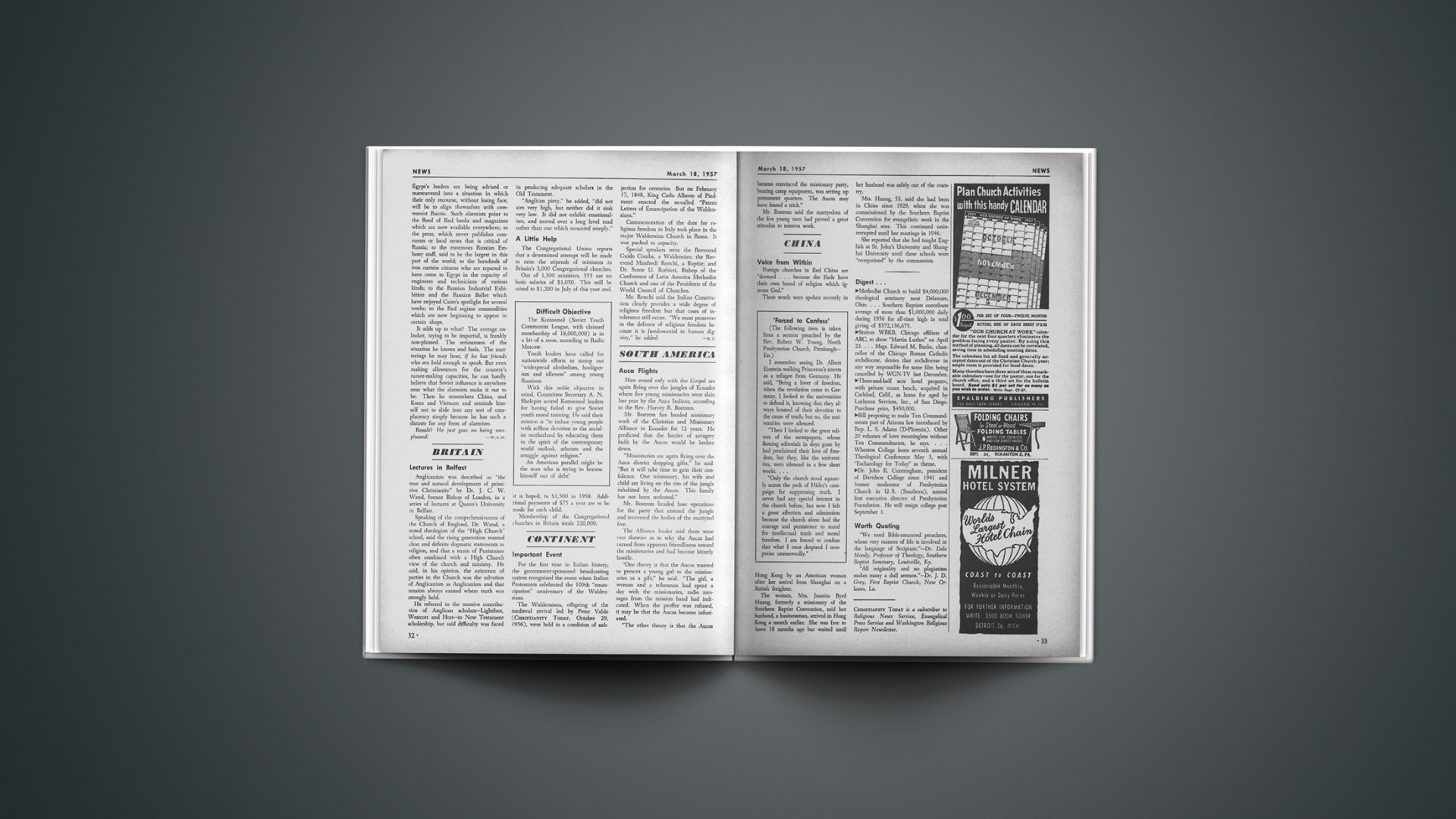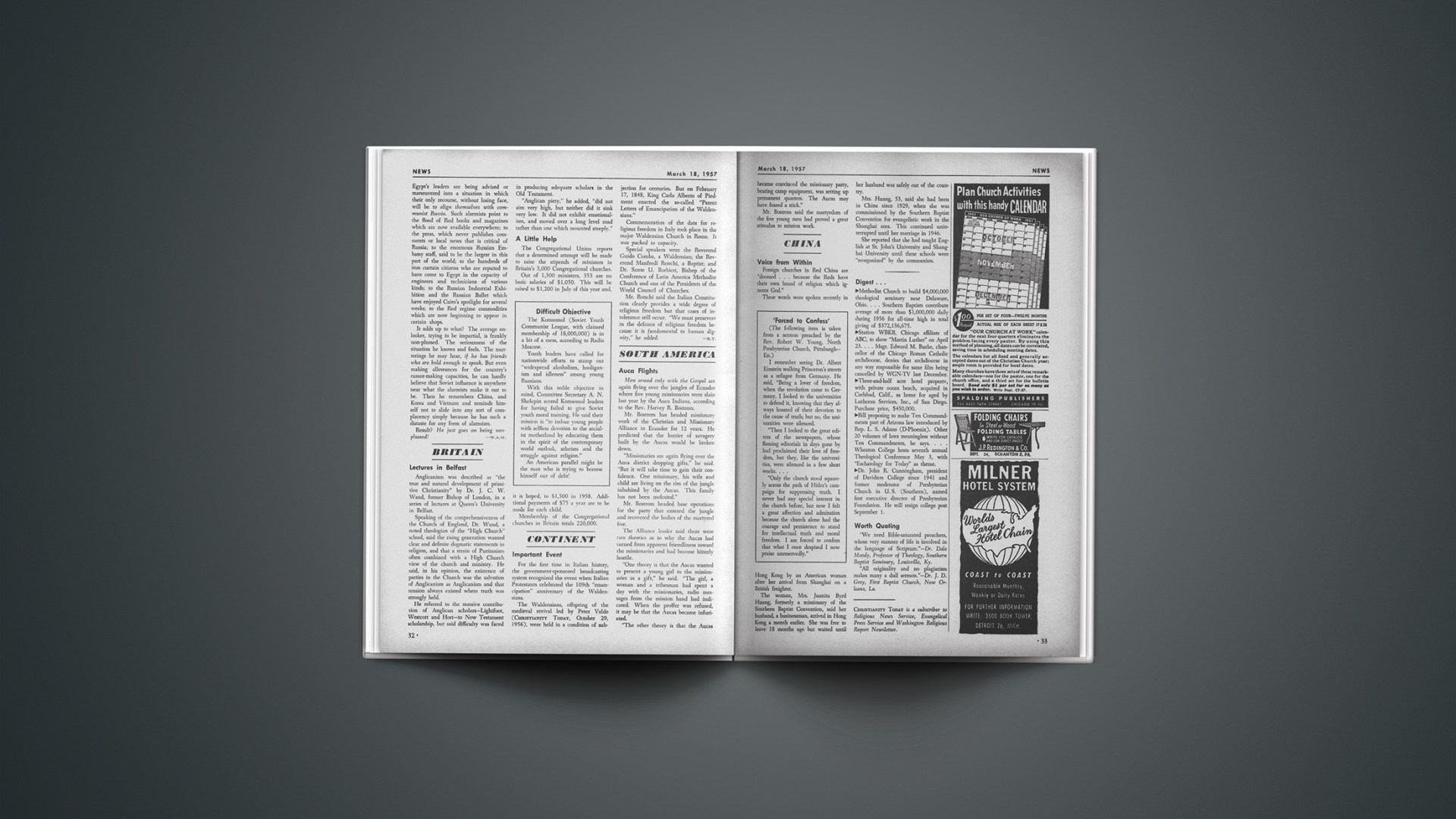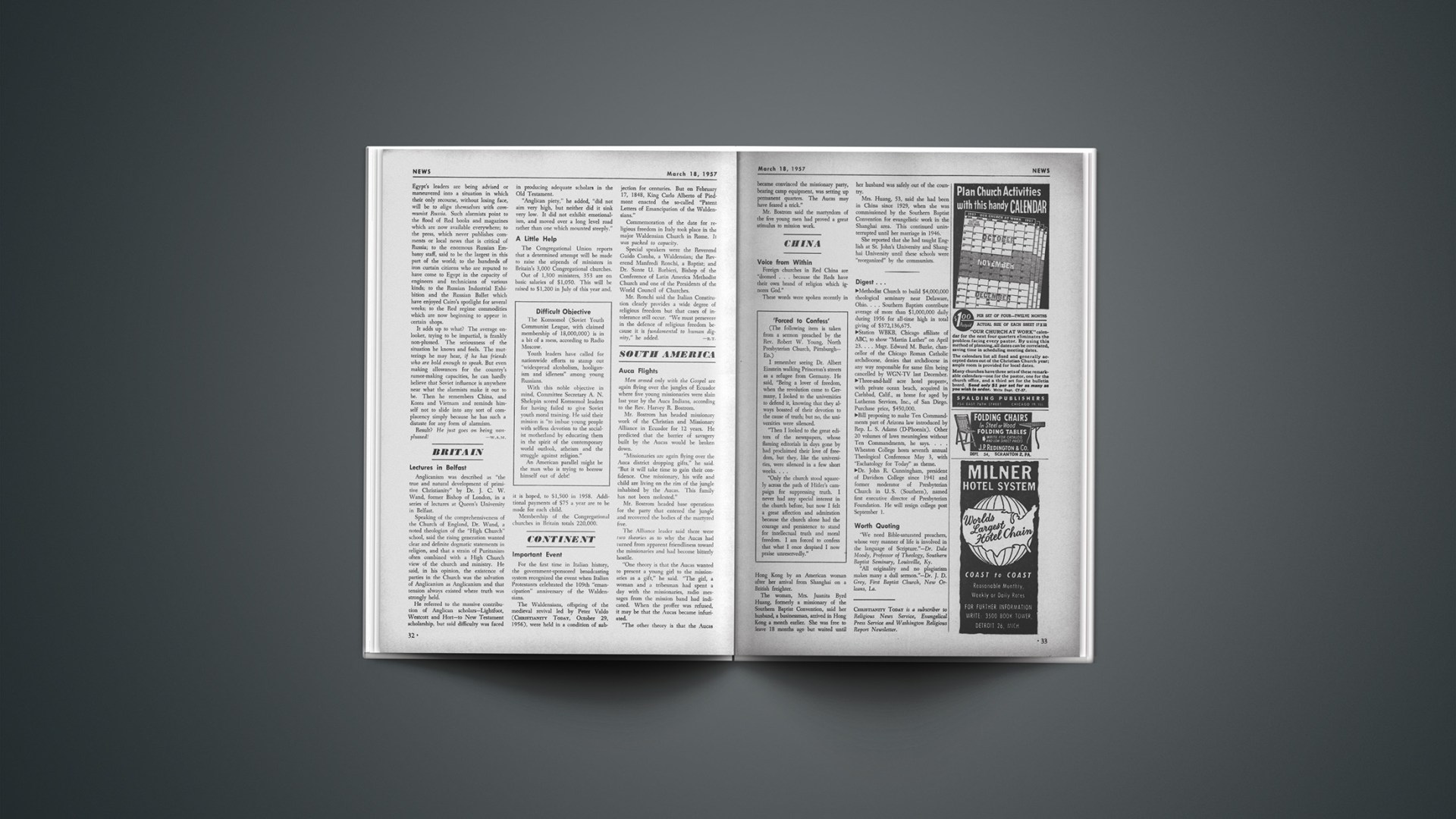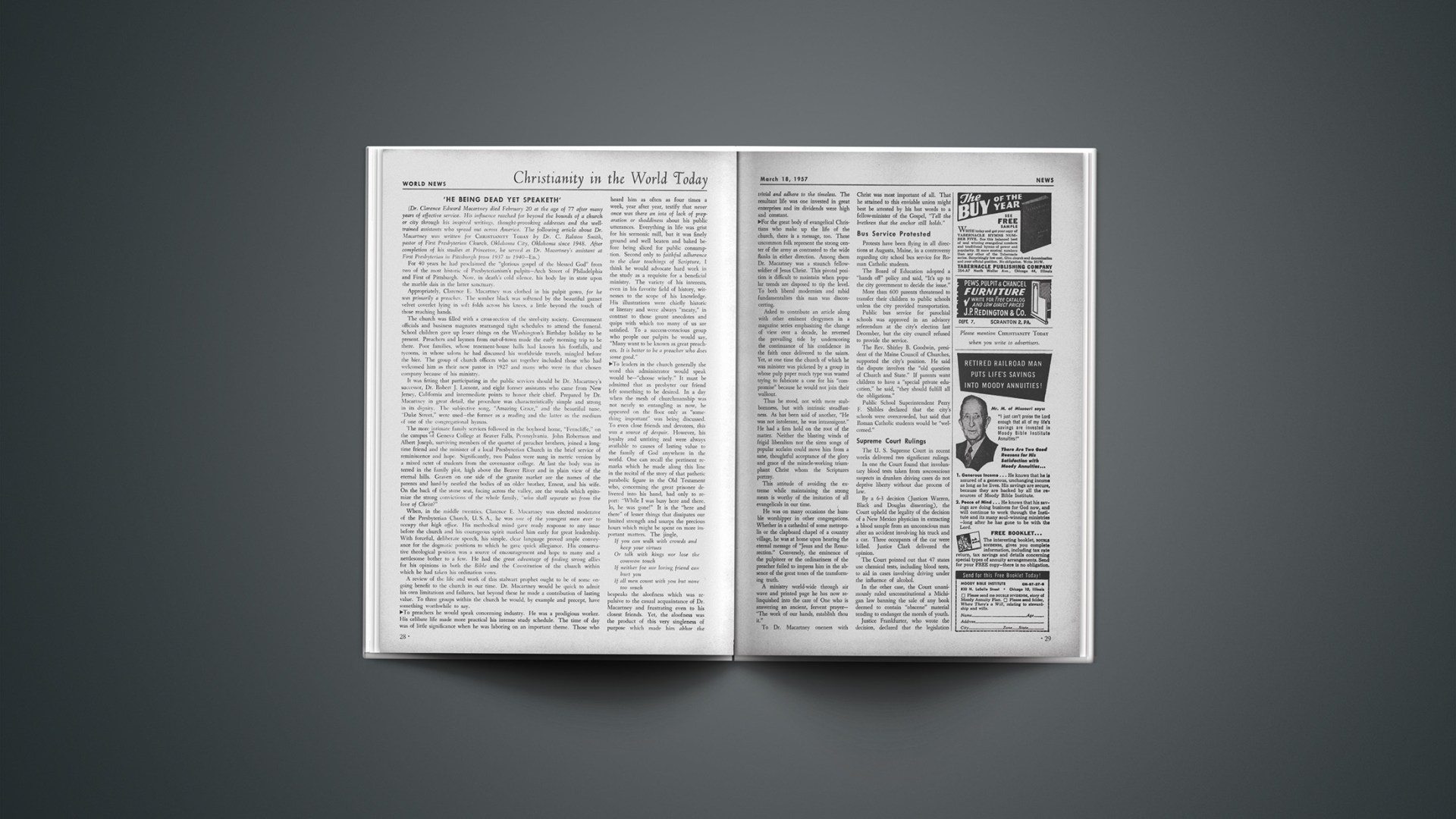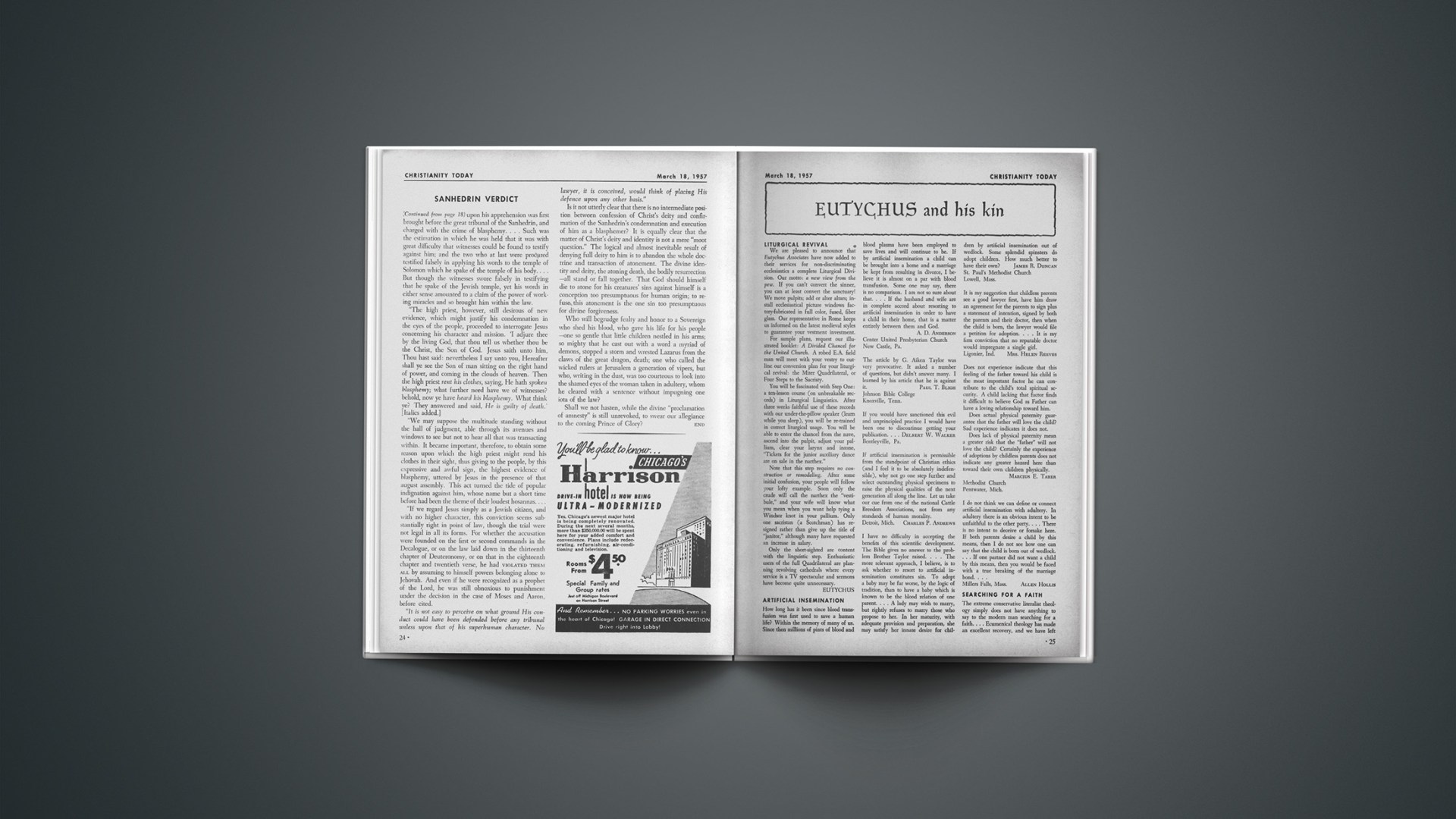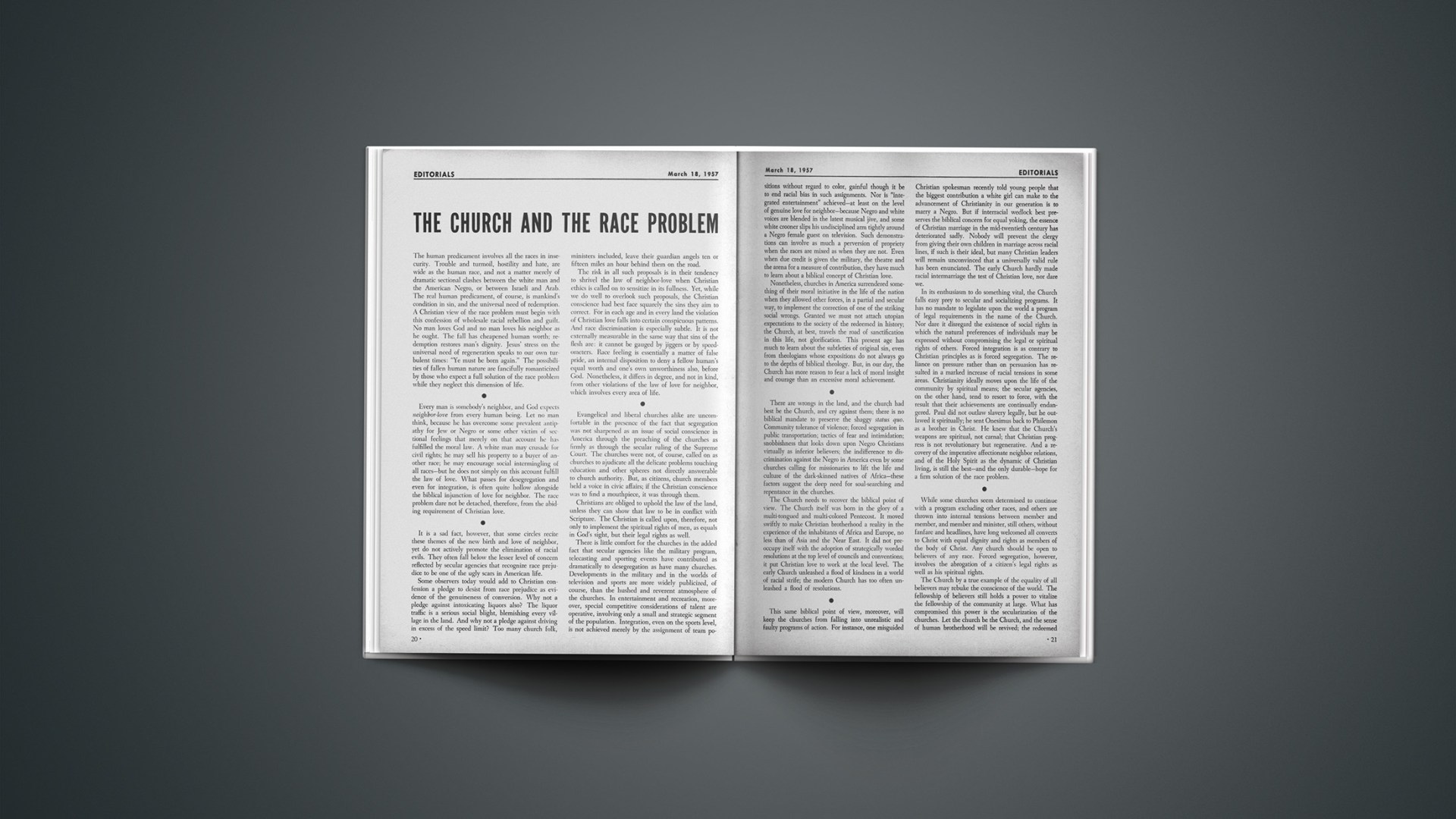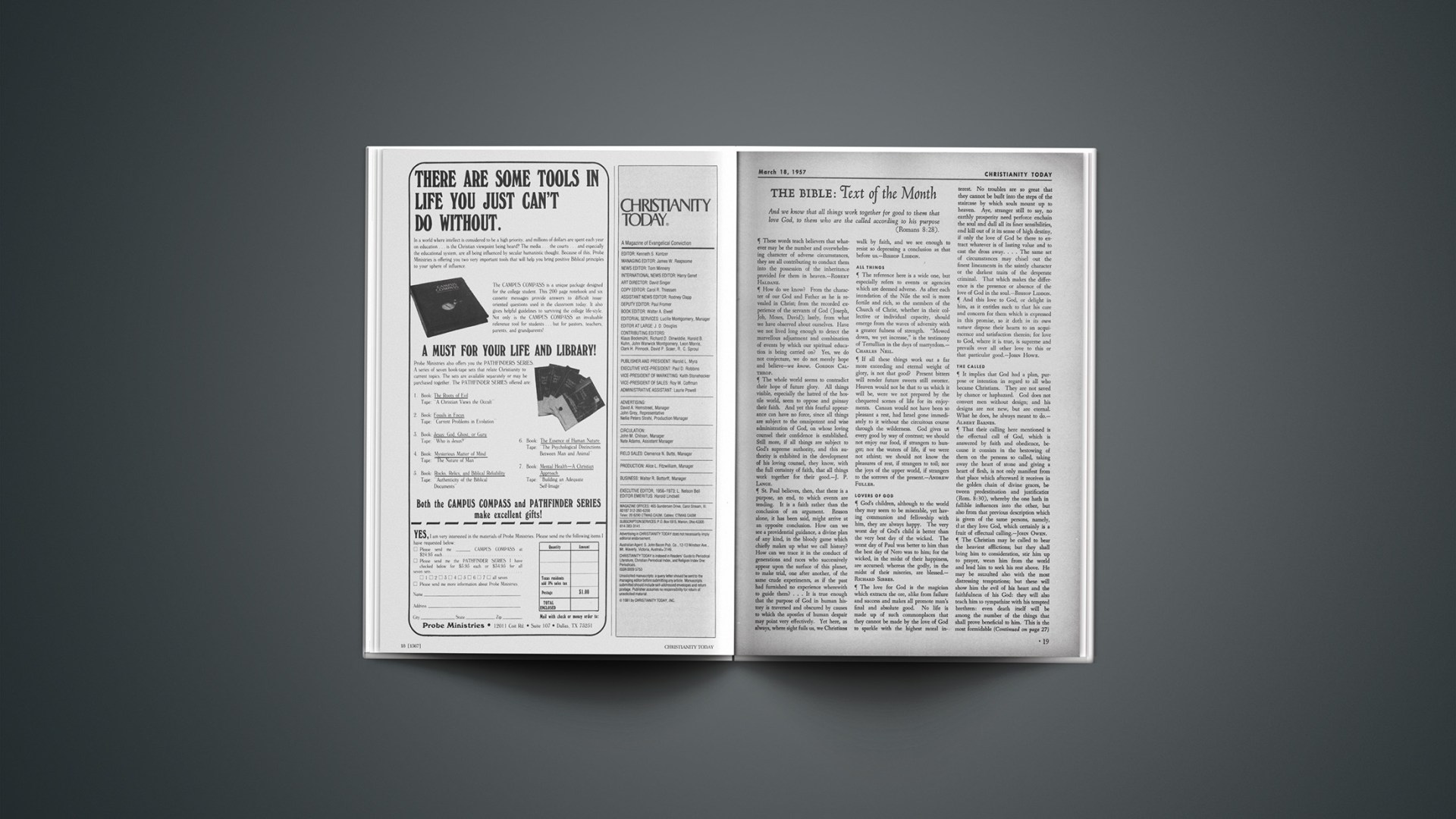Biblical Preaching
Protestant Preaching in Lent, by Harold J. Ockenga. Eerdmans, Grand Rapids. $3.95.
The spiritual vitality and fruitfulness of Boston’s famed Park Street Church are undoubtedly traceable to a number of factors. Certainly among the chief of these elements would be the priority given here to the foreign missionary enterprise and the program of solid biblical preaching which is characteristic of this pulpit. The book under review provides a good taste of what this congregation is fed, and in that respect gives us a fresh insight into the importance and the possibilities of the preaching ministry in any church.
Dr. Ockenga is convinced that we Protestants do not make enough of Lent, in the sense of using this season to direct the minds of men toward the meaning of the passion of our Lord. For twenty-five years he has devoted the Lenten season, and especially Holy Week, to series of sennons dealing with Christ and his Cross, and in the current volume, he presents seven such series, of varying lengths. Obviously, the complete sermons are not given here, but on the other hand, neither are these brief outlines. The substance of each sermon is here, together with some of the illustrative material. In addition, each series is prefaced by an introduction, which in some cases gives suggestions as to other sermon themes which might be developed under the same general topic.
This is careful, thoughtful preaching, thoroughly based in the Word. (Many of the sermons preached today in evangelical pulpits are doctrinally sound, yet lack a strong biblical foundation.) Dr. Ockenga’s work shows all the marks of thorough study. His outlines are helpful, and they consistently present a logical development of thought. A whole series of messages on Isaiah 53 comes out of a careful exegesis of the Hebrew text. On occasion, he takes a phrase of Scripture and allows it to be the starting point or the presentation of an important biblical doctrine. An example of this is his sermon on the Kingdom of God, based on the text “Art Thou a King?”
These presentations of scriptural truth are scholarly, but in no sense academic, in the unfavorable sense of that term. Dr. Ockenga is preaching to the needs of his congregation and he is ever insisting on a human response to Divine truth.
The book commends itself for devotional reading, but it should have a further ministry in quickening pastors and other Christian leaders to a more thorough study of the Book, and a more adequate presentation of its truths.
H. L. FENTON, JR.
Lenten Sermons
The Seven Words Front the Cross, Ralph G. Turnbull. Baker, 1956. $1.50.
This compact volume of sermons under the headings of Forgiveness, Assurance, Comfort, Desolation, Suffering, Triumph and Committal contains much source material of value to preachers and teachers. The outlines are homiletically correct and reveal considerable originality and imagination. “The Word of Suffering,” for example, is developed around three simple but striking points: it was Natural; it was Unnatural; and it was Supernatural. Strongly doctrinal in its orientation, the volume abounds in telling illustrations. Certainly the author leaves no doubt as to his own understanding and appreciation of the historic Christian faith. Yet the volume leaves something to be desired from the point of view of finished expression of these ideas. At times Dr. Turnbull’s sentence structure is rather choppy and his choice of words not too discriminating. Greater precision of expression might have enhanced the book’s worth, though the sermons were obviously prepared to be preached rather than read.
ERIC EDWARD POULSON
Antithesis
Speculation in Pre-Christian Philosophy, by Richard Kroner. Westminster. $5.75.
This is the first of three volumes in which Professor Richard Kroner, lately of Union Seminary, now at Temple University, will attempt to explain the entire history of philosophy on the basis of an antithesis between impersonal, objective speculation and practical, personal revelation.
While this antithesis at first sight seems eminently applicable to medieval philosophy, one wonders whether it can contribute to the understanding of the Greek period.
In defense of the thesis that Greek philosophy is a compound of speculation and revelation, Kroner begins with the somewhat enthusiastic assertion that Thales’ speculation is “an analogue to the revealed truth on which Christian thinkers later relied” (p. 10).
After Thales, “from the perspective of the relation between revelation and speculation it is of supreme importance that Anaximander, though on the level of cosmotheism or pantheism, thus approached the biblical conception of the Supreme Being. He anticipated what the Bible and Christian theology mean by the infinite” (p. 83).
Here Kroner tries to argue that Anaximander’s Infinite is not something potential, but a mysterious Actual; and that the ordinary interpretation which views the boundless simply as the reservoir of physical stuff out of which our cosmos developed, “as if only the language were imaginative … is extremely arbitrary and ‘unscientific’ ” (p. 85). Yet the doxographical material supports the usual interpretation, as does the matrix of pre-Socratic philosophy from which it comes. Even if Anaximander’s boundless were infinite in space (a view against which Cornfed has raised sober objections), and still more if the boundless is infinite in the sense of having no definite quality, it would be hard to see any resemblance to the God of Abraham, Isaac and Jacob.
When further it is said that the stories about Socrates (drinking the rest of the crowd under the table?) “immediately put us in mind of the gospel stories” (p. 133), one is reminded of the Platonic thesis in the Phaedo that that which stimulates the memory need have no resemblance to what is remembered. Here Kroner has given himself over to pure impressionism; and his other assertion that “all historians of philosophy agree that he (Socrates) is the greatest figure in the history of philosophy” (p. 151) is simply false.
A number of times Kroner modifies his first breath-taking statements. “Socrates was a Greek anticipation and counterpart of Jesus Christ” (p. 133); but then adds, “the difference between the Son of God and the Athenian … is so enormous that it makes any comparison absurd and ridiculous.” Quite so! And therefore his prior assertion is absurd and ridiculous.
The constant aim seems to be to picture Greek philosophy and the Christian Gospel as essentially the same. In one place it almost seems as if the New Testament contributed nothing to Christianity. “In Philo, Greek speculation and biblical revelation met … The whole movement of pre-Christian speculation, directed toward a more holy and ethical conception of the divine being than that offered by Greek religion, culminated and terminated in this great event …” And Kroner refers with evident approval to another author who held that “without Philo there would be no Irenaeus, Athanasius.…” Again, “He taught that the ideas are the thoughts of the living God.… Through this simple device Philo threw a bridge across the chasm dividing two spiritual spheres” (p. 237–238).
Aside from the fact that in these lines Kroner denies that Plotinus and Neoplatonism are the culmination and termination of Greek philosophy, this interpretation not only ignores the New Testament as a prerequisite for Athanasius, but it also minimizes the role of the Old Testament for Philo. It pictures Philo’s philosophy as arising, not altogether, but predominantly out of Greek themes. This is most clear in what I take to be a serious failure to grasp the significance of Philo’s making the ideas thoughts of God. This is no superficial transformation of Platonism, no simple device to bridge a narrow chasm.
In the Euthyphro when piety is defined as that which is dear to the gods, Plato asks, Are pious things pious because they are dear to the gods, or are they dear to the gods because they are pious? Now, it is not surprising that Plato chose the second alternative, but it is extremely instructive to note that he does not bother in the least to give a single reason for rejecting the first. Usually Plato gives reasons for rejecting a proposal; but not here. Does this not indicate that Plato was unable even to conceive of a God on whose will morality depends? Instead of a God who legislates, Plato could conceive only of a God subordinate to independent laws.
Philo therefore, rather than having been the culmination of a tendency already in paganism, broke completely with its deepest convictions and insisted on the totally different biblical conceptions of sovereignty and transcendence. No doubt there are similarities between Philo and Plato or the Stoics; but they are superficial. (Cf. my Thales to Dewey, pp. 183–210.)
But perhaps the major defect of the book is its hazy notion of revelation. Kroner’s characterizations are as follows: “Revelation is the work of God; the truth of revelation is practical, personal, and indemonstrable; God does not incline himself to man in order to inform him, but to command, advise, and redeem; such divine actions do not provide theological information; theological information is incompatible with the true relationship between the Creator and the creature.”
These representations partly depend on an incomplete disjunction and partly on a neglect of biblical themes. Of course it is true that God commands and redeems; but this is not incompatible with his giving information to man. When God said to Abraham, “Thou shalt be a father of many nations,” it was information; and when John wrote, “the World was made flesh,” it was information. Now, it may be true that God’s redemptive acts do not of themselves inform; but in addition to the act God has provided us with its explanation. ‘Christ died’ is the act, but ‘for our sins’ is the informative theology. Far from theological information being incompatible with the true relationship to our Creator and Redeemer, this true relationship is impossible without a minimum of information; and the more the better. Like the Athenians we cannot worship an unknown God.
Existential anti-intellectualism is no contribution to Christianity or to Greek philosophy, either.
GORDON H. CLARK
Careful Scholarship
The Life of Our Lord upon the Earth, by Samuel J. Andrews. Zondervan, Grand Rapids. $5.95.
The sub-title of this volume gives an accurate summary of its contents—“considered in its historical, chronological, and geographical relations.” Students of the life of Christ have long treasured this work of careful scholarship. This printing makes use of the revision done by Andrews in 1891. It contains a new feature, a biographical introduction by Wilbur M. Smith which puts readers for the first time in possession of information about a man who deserves to be more widely known. Dr. Smith makes the observation that this is the only scholarly life of Christ produced by an American.
Andrews was well acquainted with continental and British literature in the field, as his bibliography amply attests. His revision necessitated the consideration of a vast amount of material which had appeared in the thirty years which had intervened since the first edition was published. This was carefully appraised and sifted. One must not get the impression that the work is a mere compilation of diverse scholarly viewpoints. The considered judgment of the author is regularly brought forward and presented with modesty and discretion.
The question will inevitably be raised as to the wisdom of printing once more a book which is now more than half a century old. But the truth is that no recent book does for the reader what Andrews does, for modern works are concerned for the most part either with questions of critical methodology or with details of the narrative. Andrews provides a factual, comprehensive approach, with special help in the area of chronology (the book begins with an essay on this subject). With the aid of this volume one is in far better position to evaluate the modern works, for he will understand the basic problems of the text.
EVERETT F. HARRISON
Sources Of Power
Six Mighty Men, by W. J. Smart. Macmillan. $2.00.
Every minister and witnessing Christian longs to experience the life-changing power of God in his life and service, yet all too many of us are conscious of the lack of spiritual power in our running to and fro in the name of Christian service. What is the secret of being effectually and powerfully used by God?
In these short biographies, W. J. Smart has sought to point his finger clearly at the spiritual secret of the passion and power of six men whom God has used in a mighty way. Declaring his aim in the preface, the author says, “My aim in this book has been to catch the passion of the six men about whom I have written, and to locate, as far as possible, the secret of their power and their message for today.”
Lest we fall into the error of longing for the good old days or into the modern mood of seeking something entirely new and different, the lives of these six outstanding evangelicals span the past century. Whether we look at George Mueller, Dwight L. Moody, Hudson Taylor and Samuel Chadwick of the past or at Hugh Redwood and Billy Graham in the present—the answer is basically and fundamentally the same for God does not change.
Variety of calling is seen here—a missionary, two evangelists, a founder of an orphan’s home, a teacher and a newspaper man—but the principles and passion for Christian service are the same. Will these principles work today? These lives remind us that they will as long as the Holy Spirit works to keep the promises of God, and the spirit of God will always work to supply material and spiritual needs when out of earnest, believing hearts anyone seeks to do what God wants him to do.
These biographies are too short to tell much about the lives and labors of these men. If we want that we must turn to other sources. These stories are told with a minimum of well chosen words yet with a maximum of piercing insight focused on their sources of power. What is told of their lives is realistic, free from excessive overstatement, in good taste and characterized by an authentic note.
In our day, masses of people are giving attention to religion yet so many of them do not know what it means when they hear talk about people being surrendered and powerfully used. This small book of 151 pages would be very helpful for general reading by these people or for use as the basis of devotional talks to any small groups.
W. G. FOSTER
New Life
Christian Maturity, by Richard C. Halverson. Cowman, Los Angeles. $2.50.
This is a devotional essay addressed to all that is shallow and superficial in the church and in Christians; a plea that we let our religion “grow up.” In his foreword, Louis H. Evans describes it as a “thrilling answer” to the frustrated longing of multitudes on the spiritual frontier for a Christianity which will bring real power.
The author declares that he is not writing for those outside the fellowship of the Christian faith but to those who, though belonging and participating, may be “fed up” with their inadequate apprehension of those resources which they had expected to offer much more than they are getting. He begins by suggesting that there are—within evangelical circles, indeed—many who are “frankly bored with it all. Their Christian experience has worn thin, the spontaneity is gone, Jesus Christ himself is unreal most of the time, the lift and thrust of a new life has vanished.”
That, we must say, is quite a beginning. And if there is a major flaw in this book (which does not really suffer for having such a flaw) it is that the author does not, after all, address himself to the condition he describes, but rather to the original longing of any life without Christ. It is one thing to point out that “new life” in which there is a stirring “lift and thrust;” it is another to write to those in whose new life the lift and thrust has vanished. The author does the former. And he does it well.
The answer to any inadequate spiritual experience, explains Mr. Halverson, lies altogether in opening the door of one’s life to Christ. Spiritual growth involves progressively opening hitherto unyielded areas of the life over which Jesus Christ must be given control. If the emphasis be put on the imitation of Jesus, he continues, then let it be put upon the central control of his life, not the outward effects. Receive Christ, yield to Christ, walk in Christ. This is spiritual maturity.
This book is a delightful treatment of the golden promises of the Gospel, especially as these may be contrasted with any approach to religion which seeks the answer in anything man can do for himself or anything which can be found anywhere but in Christ. It is the kind of book of which a busy pastor wishes he had more to put into the hands of confused and hungry people.
G. AIKEN TAYLOR
Careful Exposition
Studies in the Book of Jonah, by James Hardee Kennedy. Broadman, Nashville. $1.75.
Dr. Kennedy, who is professor of Old Testament and Hebrew at the New Orleans Baptist Theological Seminary, has written this book out of the conviction that “for many serious and capable students of the Bible, Jonah offers a study of distractions. Engrossing questions bring positive teaching into eclipse and side issues become dominant” (p. XII). As a result, the author’s paramount concern has been to present the basic teachings of this Old Testament book and to show their relevance for Christian living. He has been eminently successful in accomplishing this aim.
Dr. Kennedy is thoroughly familiar with the various interpretations of Jonah, and he does not hesitate to quote scholars whose point of view differs with his own. But he is thoroughly convinced that here we have a trustworthy historical narrative that has much to say for our own day. His book is a good example of how a careful exposition of the Word of God may meet the needs of the people in the world.
The author has a real gift for sensing the underlying significance of each section of the book. In bringing forth these truths, he does not hesitate to introduce elements of exegesis of the Hebrew text, and while not every preacher will be able to follow him in the fine points of Hebrew grammar, all will appreciate his thoroughness. Many a pastor could learn much from Dr. Kennedy about how to present the Old Testament in the context of the twentieth century. Many a layman will find here that which feeds his own soul and stimulates his further thinking concerning timeless truth.
HORACE L. FENTON, JR.

